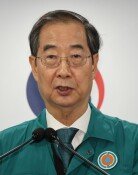Colleges Becoming Angry
In a demonstration, Jung Se-kyun of the Uri Party and Kang Jae-sub of the Grand National Party were participating, and persons from the Ministry of Education and Human Resources Development, including Suh Nam-su, assistant deputy minister, looked embarrassed because such an incident never happened before. A representative of the demonstration said, We originally had considered a professors tonsure and street demonstration, but decided to behave as intellectuals. He continued on to say, But professors should take to the streets if the government does not pay attention to our demands.
Anxiety Over Ignoring Colleges-
Colleges insist that they were totally excluded from the policymaking process regarding reform of the education system. An announcement from Kim Jin-pyo, Minister of Education and Human Resources Development in March, offended colleges because he stated that 15 universities would be selected as research-focused institutions, and the rest would be rearranged as professional institutions for educating persons specialized in industries. As a result, colleges believed that their specialized areas were being invaded.
The measures to reform the occupational education system that the Presidential Committee on Education Innovation announced on May 15 did not mention at all how to manage the college system, but made only partial arrangements on how to link education between vocational high schools and colleges. Government funding for colleges has not been sufficient, as the amount colleges received last year was only 175 billion won, one tenth of the 1,083 billion won universities received.
Kim Young-jin, the chairman of the Committee on College Affairs, said that the government ignores colleges, which is easily inferred from the fact that the Presidential Committee on Education Innovation only includes four members related to the college system out of a total of 117 members.
Universities Are Imitating Colleges-
Colleges failed to recruit 47,083 more students, amounting to 17.7 percent of the total number of seats. The competition for recruiting students is getting more and more tough amid an increase in the number of technology colleges, information polytechnic colleges, cyber colleges, open colleges, continuing education colleges, and credit bank systems. Colleges have complained that they cannot find any rationale for their existence when college graduates are discriminated against when matched up against university graduates in terms of payment, promotion, and social recognition, and when there is no close linkage between college education and certificates. They are also concerned with the fact that universities are imitating colleges. Colleges have newly established 21 specialized departments such as visual optics, dental hygiene, food design and pet science departments, and 27 universities have followed suit.
Choi Seok-gyu, the manager in charge of school affairs at Sorabol College, said that a department of pet science was opened at 43 colleges and universities, and there are several colleges closing departments due to their failure to recruit students.
Liberalization of Academic Years-
The Korean Council for College Education insists that the government should abolish the separation between ordinary colleges, technology colleges and information polytechnic colleges, and rearrange them into professional colleges for educating persons specialized in industries. Furthermore, the council suggested that the related law should be revised so that colleges can have full authority in academic years, student selection, and education courses. The Council maintained that the current two to three academic year standard for colleges should be liberalized, and that an institution in charge of college education should be established. Other administrative and financial discrimination measures against colleges should be lifted.
The Ministry of Education and Human Resources Development simply said that measures, such as the liberalization of academic years, should be carefully considered in line with the overall education system.
In-Chul Lee inchul@donga.com







